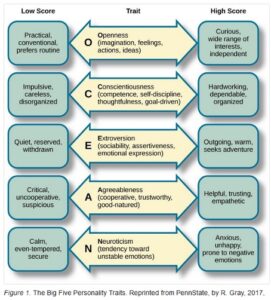”I read your Facebook post and (I think) I know who you are”, part 2: A mini-experiment on author psychology assessment
In part 1 on this blog, “A mini-history of author analysis”, I pointed out that attempting to draw conclusions about the author of a text based on traits of the text alone has a long tradition in forensics (identifying perpetrators or revealing forgeries), literary studies (authorship identification) and psychology (from psychoanalysis to modern customer/consumer behavior studies). In its modern, machine learning version, psychological author profiling is often based on the ”Big Five” model (see figure 1) going back to McCrae & Costa 1989.

But how do human readers decode and interpret concrete features of text as to its authors personality?
In order to find preliminary answers to this question, I performed a mini-experiment in my lesson on “Communicative … ↪


